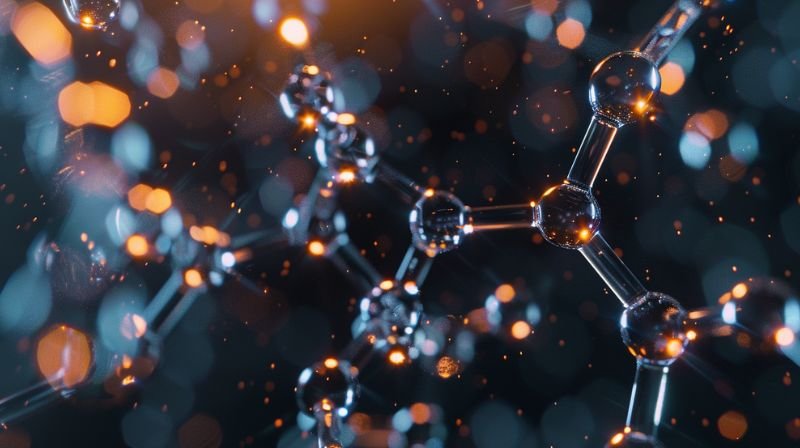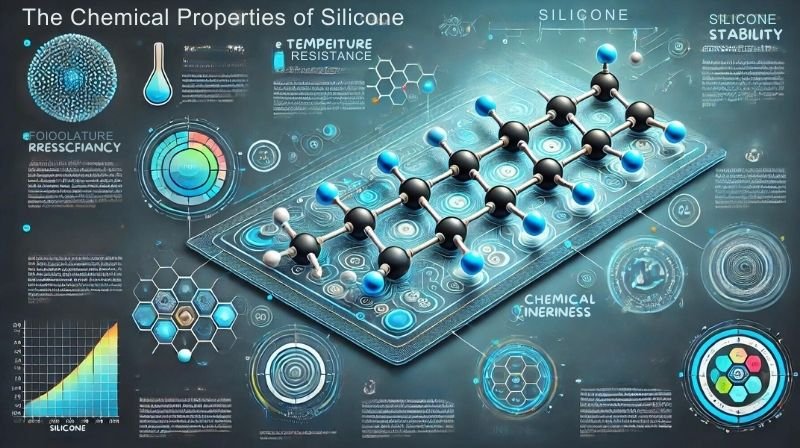Silicone is celebrated for its versatility, but what is the science behind it? Grasping the chemical properties of silicone is essential for various industries, including healthcare and construction. Without this understanding, companies may encounter issues with product performance, durability, and safety.
The distinctive chemical properties of silicone arise from its molecular structure, characterized by a backbone of alternating silicon and oxygen atoms. This configuration grants it exceptional stability and resistance to environmental influences. It is this resilience that makes silicone suitable for a wide range of applications.
Interested in how these properties influence silicone’s uses? Let’s explore further.
What Makes Silicone Chemically Unique?
Silicone’s molecular structure is crucial to its effectiveness. At its core, silicone consists of repeating siloxane (–Si–O–) units. These bonds result in a flexible and durable polymer. The inclusion of silicon, a metalloid, allows silicone to display characteristics that many organic compounds lack.
Moreover, silicone can be formulated in various ways, enhancing its versatility. This adaptability leads to different grades of silicone, each designed for specific uses. From medical devices to kitchen products, understanding these grades is vital.

How Stable Is Silicone in Different Conditions?
One of silicone’s standout features is its chemical stability. It can withstand extreme temperatures ranging from -60°C to 230°C, making it ideal for applications where other materials might fail.
Additionally, silicone is highly resistant to oxidation, ozone, and UV radiation, which enhances its longevity in outdoor settings. Industries that utilize silicone benefit from its durability, reducing the frequency of replacements.
More information: what is silicone melting temperature
What Are the Implications of Silicone’s Chemical Properties?
The implications of silicone’s properties are extensive. For instance, its biocompatibility makes it a great choice for medical applications. Silicones are non-toxic and suitable for use in implants, seals, and other medical devices, which is essential for patient safety.
In the automotive industry, silicone’s thermal stability allows it to be used in gaskets and seals that must endure varying temperatures and pressures. This results in improved reliability and performance.
How Does Silicone React with Other Chemicals?
Understanding silicone’s reactivity is crucial for manufacturers. Generally, silicones are inert and do not easily react with other chemicals. However, they can degrade when exposed to strong acids or bases.
It’s also important to note that silicone can bond effectively with various materials, which is advantageous for adhesives and sealants. Recognizing how silicone interacts with other substances aids in the development of effective products.
What Are the Common Applications of Silicone?
Silicone’s chemical properties enable a wide array of applications. In the construction industry, silicone sealants create water and air-tight barriers, improving energy efficiency and structural integrity.
In electronics, silicone serves as an insulating material. Its thermal stability protects sensitive components from overheating, showcasing silicone’s vital role across various sectors.
How Can Silicone Be Modified for Specific Uses?
Manufacturers can tailor silicone’s properties for specific requirements through several processes, such as adding fillers or altering the polymer structure. For instance, incorporating filler materials can enhance silicone’s tensile strength or modify its flexibility.
Additionally, silicone can be blended with other polymers, resulting in materials that leverage the best attributes of both substances. This ability to customize silicone makes it a preferred choice in many industries.

What Are the Environmental Considerations of Silicone?
As sustainability becomes more critical, the environmental impact of silicone is worth discussing. Silicone is often viewed as more eco-friendly than many synthetic materials. It is durable, meaning products last longer and reduce waste.
Furthermore, silicone is recyclable, although the facilities to do so may be limited. This presents an opportunity for manufacturers to explore more sustainable practices. Understanding the environmental implications of silicone can guide better choices in product development.
What Challenges Exist with Silicone Use?
Despite its many advantages, silicone is not without challenges. One concern is its adhesion properties. While silicone can bond with many surfaces, some applications may require additional primers or treatments to enhance adhesion.
Additionally, while silicone is resistant to many chemicals, it may not stand up to certain solvents. Awareness of these limitations is crucial for effective application in various industries.
How Do Manufacturing Processes Affect Silicone Properties?
The method of silicone production significantly impacts its chemical properties. There are several manufacturing processes, including addition curing and condensation curing. Each process yields different types of silicone with distinct properties.
Addition-cured silicones tend to have superior thermal and chemical resistance. In contrast, condensation-cured silicones may be less stable but are often more cost-effective. Understanding these processes helps manufacturers choose the right type for their needs.
What’s Next for Silicone Innovations?
The future of silicone technology is promising. Researchers are continually exploring new formulations and applications. Innovations in silicone could lead to breakthroughs in areas such as renewable energy and advanced healthcare solutions.
As the demand for high-performance materials grows, silicone will likely play a crucial role. Understanding its chemical properties will be essential for tapping into its full potential.
Conclusion
Silicone’s unique chemical properties, including its stability and versatility, make it invaluable across industries. By understanding these aspects, businesses can leverage silicone effectively for a variety of applications.